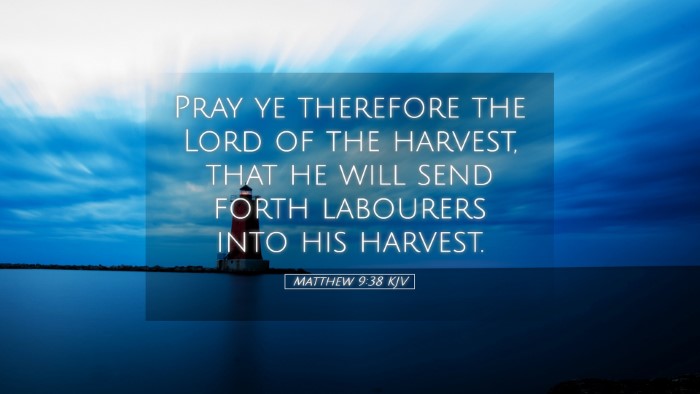Commentary on Matthew 9:38
Scripture Reference: Matthew 9:38 - "Pray ye therefore the Lord of the harvest, that he will send forth labourers into his harvest."
Introduction
This verse comes at a pivotal moment in the Gospel of Matthew, highlighting the urgency of evangelism and the need for laborers in the work of the Lord. The context of this passage underscores Jesus' compassion for the weary and scattered people, likening them to sheep without a shepherd. It encapsulates a profound aspect of Christian mission, calling believers to engage in prayer for the advancement of God's kingdom.
Contextual Analysis
To fully appreciate Matthew 9:38, it is essential to consider its surrounding verses. In the previous passages, Jesus has demonstrated his authority through healing and teaching, drawing crowds that reflect both their spiritual need and their lack of guidance. His plea to pray for laborers is both a recognition of the vast harvest that awaits and an acknowledgment of the insufficiency of human effort alone.
Matthew Henry's Insights
Matthew Henry emphasizes the necessity of prayer in harvesting souls for Christ. He notes that while the harvest is plentiful, the laborers are few. This disparity is grave, and it leads to the call for prayer to the "Lord of the harvest." Henry articulates that prayer is not merely a passive request but an active engagement in the mission of God, signifying a deep dependency on divine assistance for evangelistic work.
Albert Barnes' Interpretation
Albert Barnes expounds on the term "Lord of the harvest," explaining that this title reinforces God's sovereignty over the harvest. Barnes points out that this title implies God’s role as the supreme authority who oversees and controls everything pertaining to the harvest of souls. Furthermore, he stresses that praying for laborers is an integral part of the mission-work: it aligns believers’ hearts with God's heart for lost souls, preparing them for action and service.
Adam Clarke's Exegesis
Adam Clarke provides practical application to this verse, urging the church to participate in this mission actively. Clarke remarks that the "labourers" referred to are not merely the apostles or formal ministers but every believer who is called to share the gospel. He encourages individual and corporate prayer, arguing that through prayer, believers cultivate a spirit of readiness and urgency for ministry. Clarke's perspective compels readers to see prayer as an essential groundwork for effective outreach.
The Importance of Prayer in Evangelism
This verse informs the practice of evangelism through prayer—an acknowledgment that human efforts alone cannot fulfill the Great Commission. The act of praying for laborers reinforces community and shared mission among believers.
- Dependence on God: Prayer signifies reliance on God's power and sovereignty rather than mere human ability.
- Preparation of Heart: It opens the believers' hearts to recognize their calling and the urgency of the task ahead.
- Collective Responsibility: It fosters a sense of responsibility within the church to raise up and support those sent into the harvest.
Theological Implications
Matthew 9:38 invites us to consider several theological truths:
- God’s Sovereignty: The phrase "Lord of the harvest" affirms God's ultimate authority over salvation and the mission of the Church.
- The Nature of the Church’s Mission: The church is called to be both a praying and going body, actively pursuing God's agenda in the world.
- Human Cooperation: God invites humanity into His plan, necessitating prayer, commitment, and action—all integral to laboring in the harvest.
Practical Applications for Pastors and Students
This verse layers practical instruction for those in pastoral and scholarly roles:
- Regular Prayer for Laborers: Establish dedicated times of prayer for more workers in both local and global contexts.
- Encouraging Participation: Equip and encourage congregants to engage in personal evangelism through training and support.
- Fostering a Mission-Minded Church: Create a culture within the church that prioritizes outreach and active involvement in the Great Commission.
Conclusion
In reflecting on Matthew 9:38, the call is clear: there exists an urgent need for laborers in the harvest field. The earnest prayer for workers not only signals the distressing reality of spiritual need but also highlights the cooperative relationship between divine sovereignty and human responsibility. As the church fervently prays and takes action, it fulfills its mission, embodying the compassion of Christ for the lost while bringing glory to God through its engagement in His harvest.


